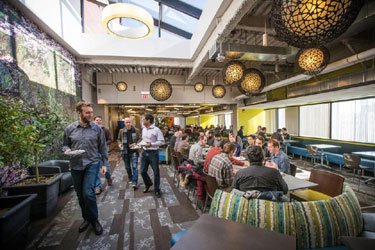
Google employees eat lubch in Kendall Square Cafeteria, Cambridge, Massachusetts
A long-time Google manager, at Marginal Revolution, describes life at Google, and critiques other major tech companies.
I joined Google [earlier]…as an Engineering Director. This was, as I understand it, soon after an event where Larry either suggested or tried to fire all of the managers, believing they didn’t do much that was productive. (I’d say it was apocryphal but it did get written up in a Doc that had a bunch of Google lore, so it got enough oversight that it was probably at least somewhat accurate.)
At that time people were hammering on the doors trying to get in and some reasonably large subset, carefully vetted with stringent “smart tests†were being let in. The official mantra was, “hire the smartest people and they’ll figure out the right thing to do.†People were generally allowed to sign up for any project that interested them (there was a database where engineers could literally add your name to a project that interested you) and there was quite a bit of encouragement for people to relocate to remote offices. Someone (not Eric, I think it probably was Sergey) proposed opening offices anyplace there were smart people so that we could vacuum them up. Almost anything would be considered as a new project unless it was considered to be “not ambitious enough.†The food was fabulous. Recruiters, reportedly, told people they could work on “anything they wanted to.†There were microkitchens stocked with fabulous treats every 500′ and the toilets were fancy Japanese…uh…auto cleaning and drying types.
And… infrastructure projects and unglamorous projects went wanting for people to work on them. They had a half day meeting to review file system projects because…it turns out that many, many top computer scientists evidently dream of writing their own file systems. The level of entitlement displayed around things like which treats were provided at the microkitchens was…intense. (Later, there was a tragicomic story of when they changed bus schedules so that people couldn’t exploit the kitchens by getting meals for themselves [and family…seen that with my own eyes!] “to go†and take them home with them on the Google Bus — someone actually complained in a company meeting that the new schedules…meant they couldn’t get their meals to go. And they changed the bus schedule back, even though their intent was to reduce the abuse of the free food.)
Now, most of all that came from two sources not exclusively related to the question at hand:
Google (largely Larry I think) was fearless about trying new things. There was a general notion that we were so smart we could figure out a new, better way to do anything. That was really awesome. I’d say, overall, that it mostly didn’t pan out…but it did once in a while and it may well be that just thinking that way made working there so much fun, that it did make an atmosphere where, overall, great things happened.
Google was awash in money and happy to spray it all over its employees. Also awesome, but not something you can generalize for all businesses. Amazon, of course, took a very different tack. (It’s pretty painful to hear the stories in The Everything Store or similar books about the relatively Spartan conditions Amazon maintained. I was the site lead for the Google [xxxx] office for a while and we hired a fair number of Amazon refugees. They were really happy to be in Google, generally…not necessarily to either of our benefit.)





Surellin
So, we see the origins of the Google culture. Smart people, yes – but very aware of being smart people and contemptuous of lesser beings. Also, largely young – and therefore arrogant and ignorant.
Please Leave a Comment!